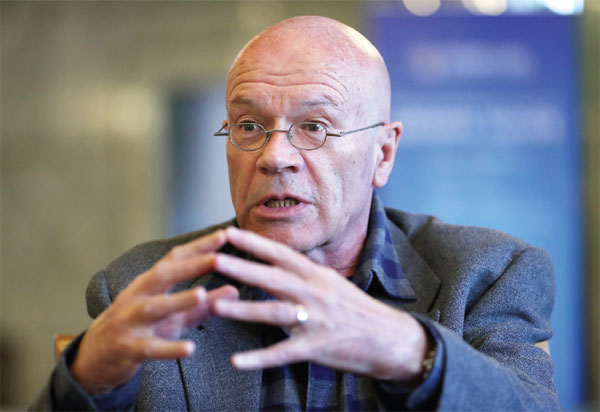Prescient author now rules the roost

Writer who predicted the rise of China as a global power argues country has proved its model of governance works
Martin Jacques, the journalist and academic, is now seen by many as the man of the moment in China.
Eight years ago, his seminal and best-selling work, When China Rules The World - which was one of the first to seriously examine the implications of the rise of the former Middle Kingdom - was widely criticized when it was published. It was even dismissed by former Hong Kong governor Chris Patten as "silly".
With a newly self-confident China striding into a "new era" after the CPC's 19th National Congress last month, his ideas are very much in vogue.
| Martin Jacques sees China as having moved into a new historical period after the election of Xi Jinping as general secretary of the Central Committee of the CPC in November 2012. Zou Hong / China Daily |
Jacques, a youthful 72, perhaps not unnaturally, feels slightly vindicated.
"I have spent a lifetime thinking deeply about a lot of political and cultural questions and I didn't find it difficult to see that China was rising and the West was declining. If you look at a lot of China writers, however, they never got it," he says.
Jacques, who was a sought-after guest on Chinese and international television channels during the meeting, was speaking at Shaoyuan Hotel on the Peking University campus, where he was lecturing.
Also visiting professor at the China Institute at Fudan University in Shanghai, he believes the congress, during which Xi Jinping Thought on Socialism with Chinese Characteristics for a New Era was enshrined in the Party's Constitution, was a defining moment.
"Xi wanted to underscore the fact that the Chinese economy is not gravitating toward capitalism. It is not going to end up as a Western-style economy or a Western-style polity and that it is going to remain profoundly different. And, in that sense, it remains firmly in a socialist rather than capitalist tradition."
Jacques believes the global financial crisis of 2008 and 2009 began to herald a change in the world which he believes has been followed by what he sees as a governance crisis in the West, providing the backdrop for a resurgent China.
"The United States has been plunged into an era of self-doubt and weakening influence in the world, which I think is now widely recognized. You cannot say the referendum (on EU membership) in the UK was a great experiment in democracy and you have got countries like Italy which have been frozen for more than 10 years because its party system is unstable."
The British journalist sees China as having moved into a new historical period of its own after the election of Xi as general secretary of the Central Committee of the CPC in November 2012.

"He has been successful in broadening the perspective about China and moved it away from defining itself in narrow economic terms, which I think had been the case after Deng Xiaoping's reform and opening-up in the late 1970s.
"He has emphasized the Chinese Dream and national rejuvenation as well as being more proactive on the global stage with initiatives such as the Belt and Road Initiative and the formation of the Asian Infrastructure Investment Bank."
The academic argues where this matters most is in the developing world, particularly in Africa, which sees China as a role model.
"The great axis that has changed is that between China and the developing world. The United States cannot relate to it in the way that China can. China is a developing country and can understand the problems of development in a totally different way."
Jacques, who is a well known left-wing thinker in the UK, was born in Coventry in England almost immediately after the end of World War II to parents who were members of the British Communist Party.
After studying at Manchester University, where he took a first class honors in economics, he was one of the youngest-ever executive members of the party in the UK at 22.
He was very much in the European Communist tradition of Antonio Gramsci than the faction of the party that remained admirers of the former Soviet Union.
Jacques rose to prominence as editor of Marxism Today for 14 years from the late 1970s onwards.
He turned it from an obscure leftwing political magazine to one that contained views and opinions from across the political spectrum as Margaret Thatcher rose to power.
Its contributors including the late Marxist historian Eric Hobsbawm, who Jacques regarded as a mentor.
Jacques went on to be deputy editor of The Independent newspaper in the mid-1990s and combines being a high-profile columnist with lecturing around the world.
Jacques says his late wife Harinder Veriah, a Malaysian-Indian lawyer who he met on holiday on the island of Tioman off the east coast of Malaysia in 1993, inspired him to write his seminal book, which has now sold more than 400,000 copies and has been translated into 15 languages.
"She taught me to see the world from a non-Western perspective. If you are always with someone of the same culture you are an insider and never looking from the outside. She helped me see my country from an outsider's perspective," he says.
"I also learned about racism. Most white liberals see it almost as an intellectual construct but it is never at the forefront of your mind."
The book, which took almost eight years to write, predicted China would become a bigger economy than the United States by 2027.
It also argued that China's governance system was an effective alternative to Western liberal democracy and represented a new form of modernity. It also introduced the concept for the first time to many Western readers that China was more a civilization state than a nation state.
"China's view of itself was tian xia, or all the land under heaven, and there were no frontiers or borders and no essential differences between peoples," he says.
The book received a very critical reaction from Western Sinologists, in particular, who regarded Jacques as an interloper on their territory.
"I wasn't a Sinologist in any shape or form. My studies had all been about the West but I think I had a sensitivity to other cultures.
"I have always had a lot of respect for Sinologists who have spent years at the coalface trying to understand China. Some have a silo mentality though. They dig deep but very narrowly. Many American Sinologists, in particular, also believe in American exceptionalism and that the US is the example to follow."
Contrasts have been made between Jacques' book and US political scientist Francis Fukuyama's The End of History and the Last Man, which was published in the early 1990s after the collapse of the Soviet Union and argued that Western liberalism had triumphed over other systems.
"I like Francis. He is a very interesting man. He, however, got that catastrophically wrong."
Jacques' views, particularly after the Party congress, are, however, now on the ascendant. His Ted Talk video alone has attracted 2.4 million views.
" Most people in the West could not conceive of the West not occupying the position of dominance it has for the past 200 years.
"I am a historian professionally and you get great periods of change throughout history and this, in my view, is one."
(China Daily Africa Weekly 11/10/2017 page32)
Today's Top News
- Global medical minds unleash hospital innovation trends
- Xi holds phone talks with Vietnam's top leader To Lam
- Chinese, Sri Lankan presidents hold talks in Beijing
- Xi's article on further deepening reform comprehensively to be published
- China-UK dialogue outcomes will enable them to reboot relationship
- Stellar Olympic performances spark craze for emerging sports































